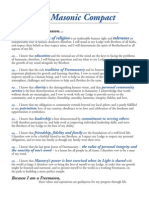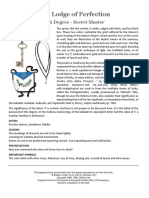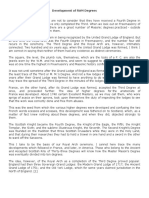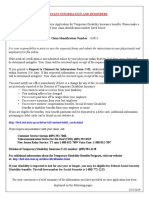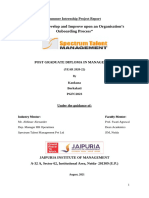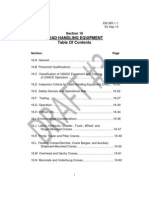Investigating Committee
Investigating Committee
Uploaded by
Denny CraneCopyright:
Available Formats
Investigating Committee
Investigating Committee
Uploaded by
Denny CraneCopyright
Available Formats
Share this document
Did you find this document useful?
Is this content inappropriate?
Copyright:
Available Formats
Investigating Committee
Investigating Committee
Uploaded by
Denny CraneCopyright:
Available Formats
THE INVESTIGATING COMMITTEE Freemasonry is a great organization and we want to offer the advantages of membership to deserving men.
But, while we seek to attract men to Freemasonry and increase our membership, we must not lower our standards. Thus, we take on a serious responsibility when we decide to give someone a petition or when we sign a petition. Fortunately, we are assisted in our efforts to guard the West Gate by an Investigating Committee. CHOOSING THE INVESTIGATING COMMITTEE The Virginia Methodical Digest provides the basic details about establishing the Investigating Committee. The Worshipful Master refers the petition to an Investigating Committee of not less than three members of the Lodge, no one of whom shall have been a voucher on the petition. The Investigating Committee makes an investigation and reports to the Master, or to the Lodge, on the moral and physical qualifications of the petitioner no later than the first stated communication after the expiration of eight weeks from the date the petition was presented in the Lodge. A Lodge may request another Virginia Lodge to conduct a supplementary investigation; the requested Lodge may comply as a matter of courtesy. [Sec 2.95] But there is much more to know about appointing an effective Investigating Committee. The Worshipful Master should appoint members who are both knowledgeable and personable and, in order to avoid bias, it is desirable for the Worshipful Master to select members who do not know the candidate. More specifically, the Worshipful Master should consider brethren who: Have a good understanding of Freemasonry, and can explain it clearly and coherently; Are active in the Lodge, and able to speak enthusiastically about Lodge activities; Are diplomatic and prudent, and convey a feeling of warmth and understanding to the potential new member; Are dedicated to doing a careful and thorough job; Are careful observers who will present an accurate and unbiased report to the Lodge; and,
It is a good idea to ensure that at least one member of the Committee is of approximately the same age as the petitioner. It also is a good idea to include a newer member, so he can learn the proper way to conduct an investigation. All of these factors are important because the members of the Committee will make a lasting impression on the petitioner and his family, and we want them to project a favorable image of our Lodge and Fraternity. They are also important because the Lodge will rely heavily upon the recommendation of the Committee. WHAT THE INVESTIGATING COMMITTEE IS EXPECTED TO DO The primary job of the Committee is to report on the moral and physical qualifications of the candidate, and whether he has a belief in a Supreme Being, but it also should determine that the petitioner understands what the Fraternity is all about and that he is joining for the right reasons. As a minimum, the Committee is expected to conduct an interview in the petitioners home to get a better sense of the person, his family, and lifestyle. If he is married, the interview should include his wife. PREPARING FOR THE INTERVIEW The Committee should begin preparations for the interview by talking with the vouchers to determine how they know the petitioner and to find out additional details about him. This advance preparation will be of use when the Committee meets with the petitioner. The vouchers also may be able to suggest additional persons the Committee might interview in an effort to learn more about the petitioner. The Committee chairman should get a copy of the petition from the Worshipful Master or the Secretary, and each member of the Committee should prepare for the interview by becoming familiar with the information supplied on the petition, taking particular note of: The petitioner's occupation and place of employment; Marital status; Number and ages of children;
Health and physical status; Personal history; and, Whether he stands convicted of an offense in a civil, federal, or military court trial, other than minor traffic offenses. The Committee chairman should call the petitioner to schedule a convenient time for the visit. If the petitioner is married, be sure to pick a time when the wife can be present. And it is a good idea to call the petitioner the night before the interview to confirm the appointment. THE PERSONAL INTERVIEW We only have one chance to make a good first impression so the appearance of the Committee members is important. Although a jacket and tie isn't mandatory, it is strongly recommended. Be sure to arrive on time, remembering that being too early is just as discourteous as being late. And refuse an alcoholic drink if it is offered; you are making an official visit not a social call. The Committee should start with introductions and a few pleasantries to break the ice and build rapport. Convey the regards and good wishes of your Worshipful Master and then give a very brief explanation about Freemasonry, the nature of the Lodge and what it does. Make it clear that a Lodge generally meets one or twice a month and that Freemasonry is family-friendly with activities for the whole family such as picnics and other social events. Finally, explain that because we take on obligations to help each other, we want to know a bit about the people we will be obligated to help. Moreover, since we are the kind of organization that you can be proud to join and one that our wives are proud to have us be members of, we have to be certain that the people who become a part of our organization are moral and upstanding individuals. With this as background, the Committee can then begin the conversation with the petitioner. At the meeting the Committee should: Review the petition with the petitioner to determine that it is accurate and that nothing important has been omitted. Inquire about the petitioners occupation, as well as his religious and community involvement to get a sense of the
person and family and to determine that he believes in a Supreme Being and is not an atheist. Establish that the petitioner is of high moral character. Ask why he petitioned in order to determine that his motives for joining are proper. Inquire if the petitioner has any serious physical disabilities so we can seek a waiver from Grand Lodge. Explain that while the Lodge only meets once or twice a month, there is a larger commitment of time during the degree process to learn about the organization and complete the required memory work. Naturally, as the conversation unfolds, follow up questions should be asked. The Committee should not only be attentive to the reactions of his wife and family, but also ask whether the petitioner or his wife have any questions, and then be ready to answer those questions. The Committee should determine if the wife is supportive of her husband joining the Fraternity, and may wish to discuss the Order of the Eastern Star, DeMolay, Rainbow, and Jobs Daughters, as these organizations may be of interest to the family. The Committee should focus on the fraternal and social, the moral and philosophical, and the charitable aspects of Freemasonry. It should explain that Freemasonry is not a religion, but open to men of all religions, with a philosophy that is in keeping with religious devotion and good morals. The Committee also should explain that Freemasonry is not a political organization. Freemasonry endorses no candidates or political party, and permits no partisan political discussions within its Lodges. It does, however, instill patriotism and foster good citizenship. In all matters, Freemasonry teaches men to think for themselves. Before you leave, ensure that the petitioner is informed of the: Meeting dates of the Lodge; Cost of yearly dues and assessments; Cost to receive the three Degrees; Commitment he must make when receiving the degrees and doing the required memory work.
Make the meeting as brief as possible; don't overstay your welcome, but make sure all questions are answered satisfactorily before you leave. If you don't know the answer to a question, admit it. Write the question down; find the answer; and, provide it to the petitioner as soon as you can. If possible, invite the petitioner and members of his family to a suitable Lodge function in order to introduce him to the Master and other Lodge members. AFTER THE INTERVIEW It is not a good idea to take written notes during the meeting. This practice is a distraction, does not help to build rapport or develop a relationship, and can impede the conversation. However, because memories fade and recollections become dim, it is important that the committee meet for just a few minutes right after the interview to compare notes. One of the members should serve as scribe and record the observations and opinions of the Committee in preparation for the report to the Master and the Lodge. If during the investigation process, the Committee discovers a major character flaw or an effort to deceive by providing false information on the petition, there should be no hesitation to recommend rejection. And, if, as a result of what you have learned, you are unable to favorably endorse the petitioner, it is appropriate to give the Brethren who signed the petition the courtesy of a factual, private explanation. An unfavorable recommendation can be presented to the Master and he can report to the Lodge that the Committee did not offer a favorable recommendation. If the recommendation is favorable, the Committee should be prepared to present its findings in Lodge before the vote is taken. Finally, the members of the Committee, along with the vouchers, should make every effort to be present when the candidate is receiving his Degrees. This ensures that the candidate sees some people in Lodge that he already knows and, thus, feels more comfortable. The vouchers and the Investigating Committee members also can make him feel welcome by introducing him to the other Lodge members.
For the Investigating Committee
Published for THE GRAND LODGE, A.F. & A.M., OF VIRGINIA by the COMMITTEE ON MASONIC EDUCATION
You might also like
- Remitence Report 5.19.23Document1 pageRemitence Report 5.19.23blackson knightsonNo ratings yet
- Walking The Tilers WordDocument1 pageWalking The Tilers WordTroy Welch50% (2)
- Worshipful Masters HandbookDocument73 pagesWorshipful Masters HandbookSergio Roberto Cavalcante100% (4)
- Look to the East: A Ritual of the First Three Degrees of MasonryFrom EverandLook to the East: A Ritual of the First Three Degrees of MasonryNo ratings yet
- CatechismDocument3 pagesCatechismcamadi000100% (2)
- The Ancient and Accepted Scottish Rite of Freemasonry - Instructions To All The DegreesDocument242 pagesThe Ancient and Accepted Scottish Rite of Freemasonry - Instructions To All The DegreesMario Filho75% (4)
- The 2nd Degree Tracing Board Intresting PointsDocument4 pagesThe 2nd Degree Tracing Board Intresting PointsAlejandro GarciaNo ratings yet
- Masonic CompactDocument1 pageMasonic CompactjerbeztNo ratings yet
- Daughters of Sphinx Initiation Ceremony of The Degree of Daughter of Sphinx (3 Degree)Document8 pagesDaughters of Sphinx Initiation Ceremony of The Degree of Daughter of Sphinx (3 Degree)cerbervsNo ratings yet
- Prince Hall PDFDocument3 pagesPrince Hall PDFStormey BecoolnowNo ratings yet
- Prince Hall The ChristDocument18 pagesPrince Hall The ChristAdam King PIn De'Andre100% (2)
- Ancient and Masonic Order of The Scarlet Cord 1Document7 pagesAncient and Masonic Order of The Scarlet Cord 1Cristian CristiNo ratings yet
- The Scottish Rite Master Craftsman Program: by Curtis N. Lancaster, 33°, Lt. Grand Commander and SGIG in Utah UtahDocument23 pagesThe Scottish Rite Master Craftsman Program: by Curtis N. Lancaster, 33°, Lt. Grand Commander and SGIG in Utah UtahKangkan KalitaNo ratings yet
- The Mis Education of The Negro MasonDocument5 pagesThe Mis Education of The Negro Masonsecretgecko100% (1)
- Funeral ManualDocument43 pagesFuneral ManualnicolasfloNo ratings yet
- PetitionDocument2 pagesPetitionapi-303753158No ratings yet
- The Grand Lodge of Free and Accepted Masons of Ohio: Officers ManualDocument60 pagesThe Grand Lodge of Free and Accepted Masons of Ohio: Officers ManualMichel Breuer0% (1)
- Direttorio ESDocument81 pagesDirettorio ESRubénBaidezLegidosNo ratings yet
- Fifteen Points For Masonic Education (PDF Library)Document6 pagesFifteen Points For Masonic Education (PDF Library)Kevin ColeNo ratings yet
- The Status of Colored FreemasonsDocument5 pagesThe Status of Colored Freemasonsking_deez100% (1)
- Lodge LayoutDocument8 pagesLodge LayoutDAGS shankerNo ratings yet
- A Walk About The Lodge, Ed. 2012Document6 pagesA Walk About The Lodge, Ed. 2012TEKNo ratings yet
- ScottishDocument6 pagesScottishluca_sergiuNo ratings yet
- 4th PDFDocument1 page4th PDFEliseo TiburcioNo ratings yet
- PRINCE HALL The Pioneer of Negro Masonry PDFDocument8 pagesPRINCE HALL The Pioneer of Negro Masonry PDFStormey BecoolnowNo ratings yet
- Indignation: A Psychological Profile of the Infamous John G. JonesFrom EverandIndignation: A Psychological Profile of the Infamous John G. JonesNo ratings yet
- Soberano Santuario: A L G D S A D L MDocument11 pagesSoberano Santuario: A L G D S A D L MDanilo Santos Rocha100% (1)
- Indiana State UniversityDocument21 pagesIndiana State Universitysufidub786No ratings yet
- Grand Lodge - EA Manual - Oct 23 - 2008-2Document112 pagesGrand Lodge - EA Manual - Oct 23 - 2008-2Brandon JurandNo ratings yet
- Race and FreemasonryDocument36 pagesRace and FreemasonryWashington Lodge No. 21No ratings yet
- Instruction HandoutsDocument8 pagesInstruction HandoutsTroy WelchNo ratings yet
- York Rite InfoDocument2 pagesYork Rite Inforealnewbie75% (4)
- A Freemason's Pocket Companion by H Washbourne 1831Document139 pagesA Freemason's Pocket Companion by H Washbourne 1831Keith JundeaconNo ratings yet
- Clandestine DefinitionDocument12 pagesClandestine DefinitionBro. Spencer C. Northrup100% (2)
- Development of RAM DegreesDocument2 pagesDevelopment of RAM Degreesjoe100% (1)
- Further Symbolism of The Entered Apprentice DegreeDocument6 pagesFurther Symbolism of The Entered Apprentice DegreeRaeford WattsNo ratings yet
- Bogus Colored MasonsDocument45 pagesBogus Colored MasonsTony Mad Brown75% (4)
- Entered Apprentice Study GuideDocument30 pagesEntered Apprentice Study GuidejhdphaNo ratings yet
- The Ceremony of Exaltation: The Supreme Grand Royal Arch Chapter of New ZealandDocument8 pagesThe Ceremony of Exaltation: The Supreme Grand Royal Arch Chapter of New ZealandStradin bien-aimeNo ratings yet
- Allegories of Hiram AbiffDocument8 pagesAllegories of Hiram AbiffJaycee Negron100% (1)
- Apprentice Training Masonic - For The New Masonic Education OfficerDocument21 pagesApprentice Training Masonic - For The New Masonic Education OfficerzttoshaNo ratings yet
- Capitular MasonryDocument4 pagesCapitular MasonryjoeNo ratings yet
- Significance of The Ark of The Covenant PDFDocument10 pagesSignificance of The Ark of The Covenant PDFusakusakusak100% (2)
- Officers HadbookDocument52 pagesOfficers HadbookJason StrucinskiNo ratings yet
- 1725 Masonic CatechismDocument4 pages1725 Masonic CatechismTos-El BashirNo ratings yet
- Catechism As Ritual 3Document14 pagesCatechism As Ritual 3Miles Goldmind Armstead100% (2)
- Charge After Initiation Irish RitualDocument2 pagesCharge After Initiation Irish RitualhermanNo ratings yet
- Minutes of Lodge Meeting (Legal - Size)Document1 pageMinutes of Lodge Meeting (Legal - Size)Juan Carlos AnguloNo ratings yet
- SRMember Handbookv 2Document91 pagesSRMember Handbookv 2democ2100% (1)
- Grand Lodge Entered Apprentice InstructionDocument29 pagesGrand Lodge Entered Apprentice InstructiongayatrixNo ratings yet
- The Twelve Original Points of FreemasonryDocument2 pagesThe Twelve Original Points of FreemasonryPrince ChavisNo ratings yet
- Charge After InitiationDocument2 pagesCharge After InitiationhermanNo ratings yet
- FCFMCDocument4 pagesFCFMCjoecus3314320% (1)
- Perfect Ashlar 2012Document134 pagesPerfect Ashlar 2012HMay15No ratings yet
- MasterMason DegreeDocument32 pagesMasterMason Degreenwg002100% (1)
- The Three Great LightsDocument8 pagesThe Three Great LightsJohn TarakdjianNo ratings yet
- Manual of the Lodge: The Truth Behind the Degrees of Entered Apprentice, Fellow Craft, and Master MasonFrom EverandManual of the Lodge: The Truth Behind the Degrees of Entered Apprentice, Fellow Craft, and Master MasonNo ratings yet
- The Principles of Masonic Law: A Treatise on the Constitutional Laws, Usages and Landmarks of FreemasonryFrom EverandThe Principles of Masonic Law: A Treatise on the Constitutional Laws, Usages and Landmarks of FreemasonryNo ratings yet
- TDI Claim SummaryDocument4 pagesTDI Claim SummaryAnonymous UH3ooofwuNo ratings yet
- BBA HR SpecializationDocument7 pagesBBA HR SpecializationmeenakshiduhanNo ratings yet
- Test Code 28Document37 pagesTest Code 28Gopala KrishnanNo ratings yet
- Level 1 Paper 7 Cost and Management Accounting: Mat-Cpa-P7 Lecturer: SAMUEL MUKOBEDocument21 pagesLevel 1 Paper 7 Cost and Management Accounting: Mat-Cpa-P7 Lecturer: SAMUEL MUKOBEAtukwatse PamelaNo ratings yet
- Daewoo Project ReportDocument16 pagesDaewoo Project ReportAbid Majeed MalikNo ratings yet
- Research Paper HomelessnessDocument9 pagesResearch Paper Homelessnessapi-590719289No ratings yet
- F 005 CS FORM 6 Application For LeaveDocument4 pagesF 005 CS FORM 6 Application For LeaveCamille Marquinez Alcaraz-AndalNo ratings yet
- ManagementDocument7 pagesManagementYasirNo ratings yet
- Labrel Case DigestsDocument150 pagesLabrel Case DigestsClaudine GolangcoNo ratings yet
- Summer Intrenship Project For Onboarding ProcessDocument48 pagesSummer Intrenship Project For Onboarding Processvinaygrover14365No ratings yet
- Bisaya Land Transportation Co., Vs CIRDocument2 pagesBisaya Land Transportation Co., Vs CIRKeshaNo ratings yet
- EquinorDocument3 pagesEquinorLuisa FernandaNo ratings yet
- Work From Home - Benefits and ChallengesDocument7 pagesWork From Home - Benefits and ChallengesCristi StavoNo ratings yet
- Management Motivation EOMDocument18 pagesManagement Motivation EOMI AM LEGENDNo ratings yet
- Confidential in The WorkplaceDocument1 pageConfidential in The WorkplaceAkiraNo ratings yet
- To What Extent Was The Great Depression The Most Significant Factor That Helped Hitler Become Chancellor in 1933Document3 pagesTo What Extent Was The Great Depression The Most Significant Factor That Helped Hitler Become Chancellor in 1933Nicolas RandlNo ratings yet
- Occupation-Based Socioeconomic Index With Percentile RanksDocument103 pagesOccupation-Based Socioeconomic Index With Percentile RanksTuan PhanNo ratings yet
- Sarah Fadel - Research PaperDocument8 pagesSarah Fadel - Research Paperapi-388588217No ratings yet
- AndmNotice 42 29 Posts Engl 070723 - 0Document3 pagesAndmNotice 42 29 Posts Engl 070723 - 0Awadhesh MalviyaNo ratings yet
- ALI Intelligence Report 2014 PDFDocument60 pagesALI Intelligence Report 2014 PDFLiyana ShahiminNo ratings yet
- Campus Placement Proposal - 2023-24 (7IPL Software & IT Solutions - A Seven Group India Company) NewDocument2 pagesCampus Placement Proposal - 2023-24 (7IPL Software & IT Solutions - A Seven Group India Company) New81 SYBCOM A SHREYA SHINDENo ratings yet
- Pankaj YadavSEPT - 2022Document1 pagePankaj YadavSEPT - 2022dhirajutekar990No ratings yet
- First Semester Bcom Management Concepts and Principles 2019Document12 pagesFirst Semester Bcom Management Concepts and Principles 2019suluslash5858No ratings yet
- Master Teacher I Elementary CS Form IDocument5 pagesMaster Teacher I Elementary CS Form IJessica VillanNo ratings yet
- A Study To Understand The Situation of Arunthatiyar Girls in Sumangali Thittam in Tamil NaduDocument86 pagesA Study To Understand The Situation of Arunthatiyar Girls in Sumangali Thittam in Tamil NaduVinay BhatiyaNo ratings yet
- Canterbury Tales CharactersDocument3 pagesCanterbury Tales CharactersSarahNo ratings yet
- EM385 CranesDocument92 pagesEM385 CranesSammie WilliamsNo ratings yet
- DIGEST Jose Santos Vs Hagonoy InstituteDocument1 pageDIGEST Jose Santos Vs Hagonoy InstituteManz Edam C. JoverNo ratings yet
- Hrd-Embluju Inc - Jabronis-Uniform PolicyDocument6 pagesHrd-Embluju Inc - Jabronis-Uniform PolicyFrance Marie NTNo ratings yet







